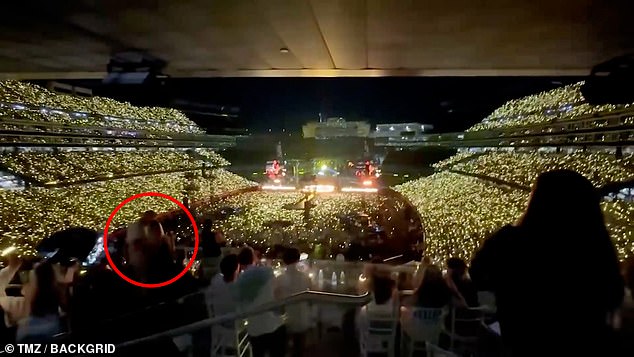A disturbing video showing militants forcing Druze men to jump off a balcony to their deaths as they are sprayed with bullets has emerged online.
The chilling footage encapsulates the plight of the Druze people in Syria as the country continues to descend into sectarian conflict.
The fighting is the latest challenge to the control of Sharaa’s Islamist-dominated government, which took over after rebels toppled autocratic president Bashar al-Assad in December.
It puts into focus the nation’s fragile security as the new government attempts to impose its authority over the fractured country and its deep-rooted sectarian divisions.
The conflict started last week as clashes between the Druze – a religious minority native to southern Syria, the Israeli-occupied Golan Heights and parts of Lebanon and Jordan – and Syrian Bedouin tribes.
Government forces then arrived to try to quell tensions, clashing with Druze gunmen and attacking the Druze community.
The latest violence once again pitted Druze against Bedouin, witnesses said.
The fighting has drawn in neighbouring Israel, which carried out airstrikes in southern Syria and on the defence ministry in Damascus this week while government forces were fighting with the Druze.
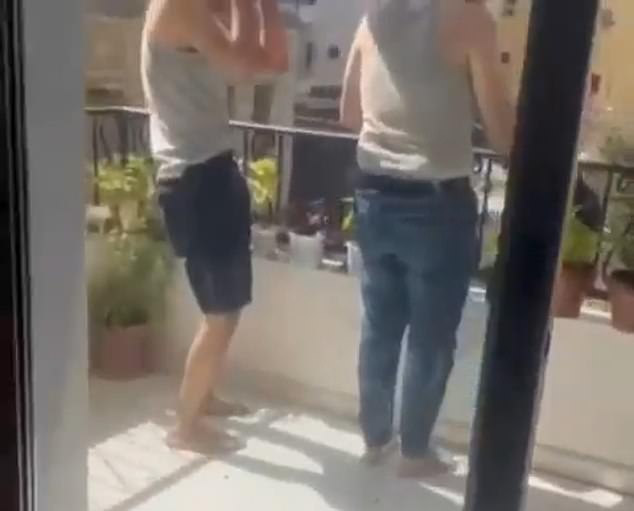
The disturbing video shows the Druze men (pictured) being forced to jump off a balcony to their deaths while being sprayed with bullets
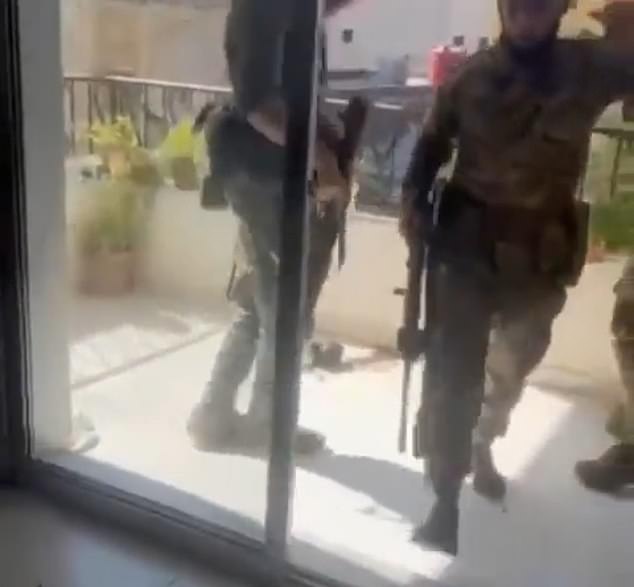
The unidentified militants were wearing camouflage and carrying machine guns
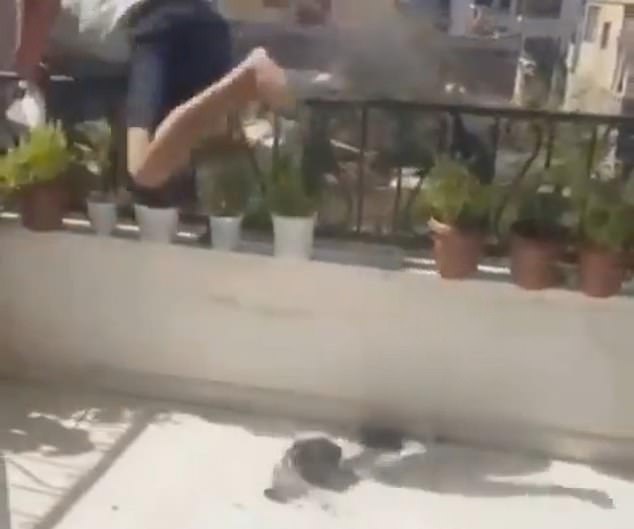
The harrowing footage encapsulates the plight of the Druze people in Syria as the country continues to descend into sectarian conflict
Israel says it is protecting the Druze, who also form a significant minority in Israel.
But Israel and Washington differ over Syria. The U.S. supports a centralised Syria under Sharaa’s government, which has pledged to rule for all citizens, while Israel says the government is dominated by jihadists and a danger to minorities.
In March, Syria’s military was involved in mass killings of members of the Alawite minority, to which much of Assad’s elite belonged.
The deadly unrest, along with the Israeli bombing strikes, has re-ignited fears of a security breakdown in Syria.
The war-torn nation is still recovering from the fallout from over a decade of civil war, and the recent Islamist-led rebel takeover of Damascus in December 2024.
More information about the harrowing footage of the Druze men jumping to their deaths has been reported by the Middle East based journalist Jenan Moussa.
She spoke to the family members of those killed and revealed their identities as Muath Arnous (2002), a dentistry student, Baraa Arnous (2005), an engineering student, and Osama Arnous (1998), a dentist.
Muath and Baraa were brothers, Osama was their cousin.
The killings happened on Wednesday July 16 the mainly Druze city of Suwayda in southern Syria.
On X/Twitter Moussa wrote: ‘After their fall off the balcony, the gunman cheered and celebrated.
‘A while ago, I got a message from one of the Arnous family members who lives abroad. It simply read: “My family is in danger. Please help”.’
The tragic end of the Arnous family comes as fighting continued to rage in the area on Saturday.
Machinegun fire and mortar shelling rang out after days of bloodshed as the Islamist-led government struggled to implement a ceasefire.
Reuters reporters heard gunfire from inside the city of Suwayda and saw shells land in nearby villages.
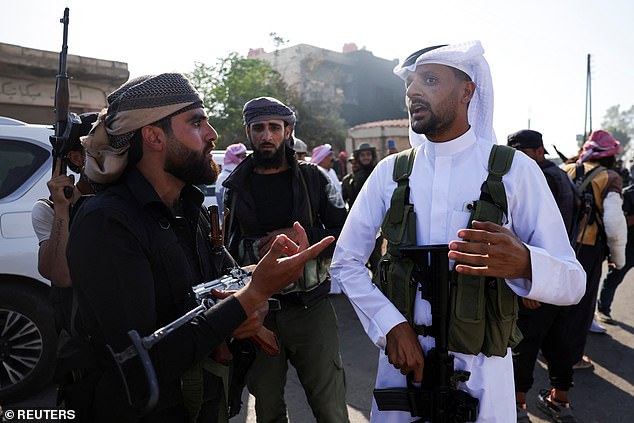
Bedouin fighters talk at an Internal Security Forces checkpoint working to prevent Bedouin fighters from advancing towards Suwayda, Syria, July 19
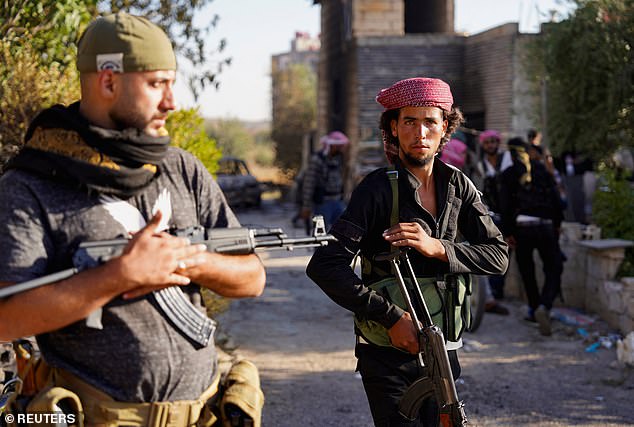
Bedouin fighters stand together with their weapons, after sectarian clashes escalated on Saturday in Syria’s predominantly Druze region
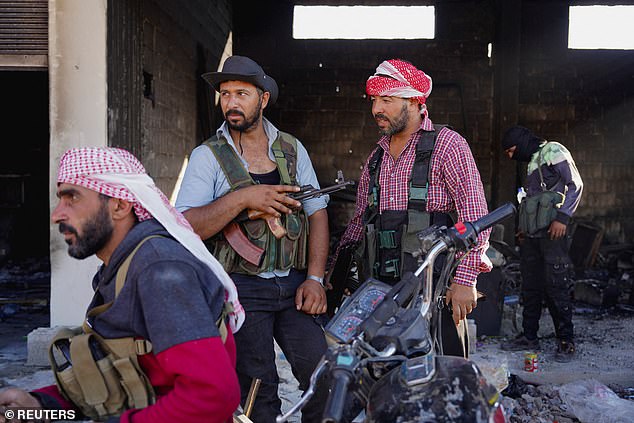
Bedouin fighters stand with their weapons after sectarian clashes on July 19
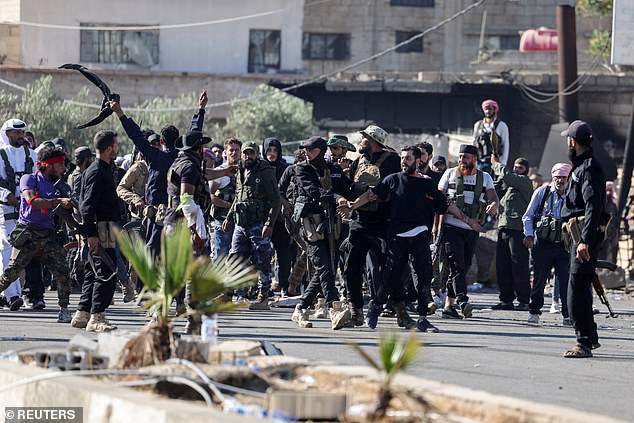
Internal Security Forces officers escort a Druze prisoner and prevent him from being attacked by Bedouins on July 19
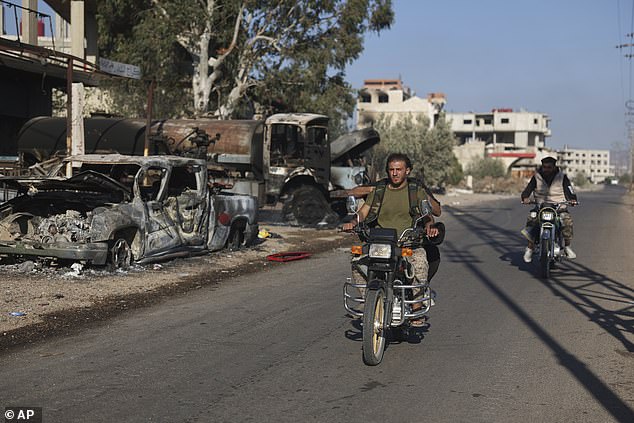
Bedouin fighters ride motorcycles past burned vehicles in Mazraa village on the outskirts of Suwayda city
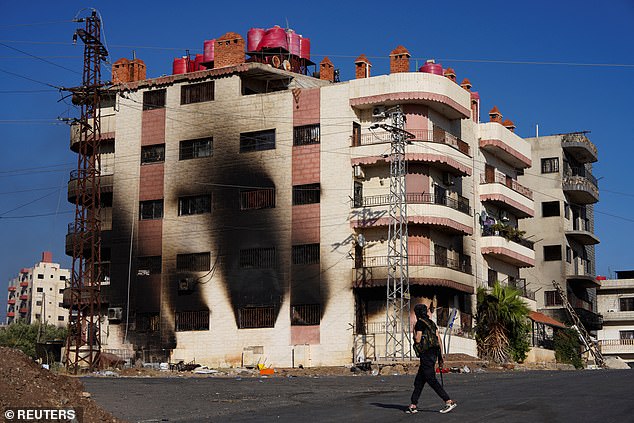
A bedouin fighter walks near a burnt building after sectarian clashes escalated on July 19
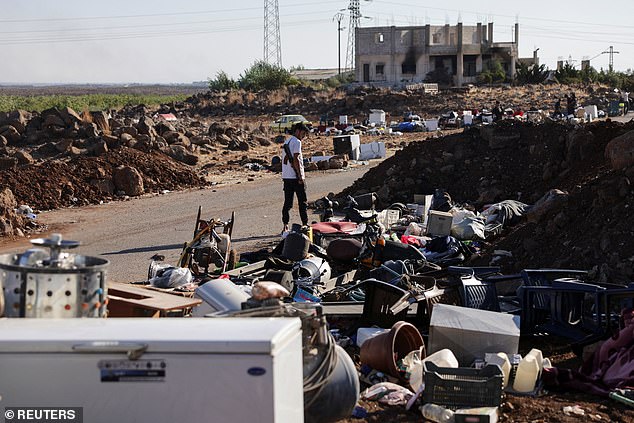
Confiscated stolen items are scattered at an Internal Security Forces checkpoint on July 19
Mansour Namour, a resident of a village near Suwayda city, said mortar shells were still landing near his home on Saturday afternoon, and that at least 22 people had been wounded.
A doctor in the city said a local hospital was full of bodies and wounded people from days of violence.
‘All the injuries are from bombs, some people with their chests wounded. There are also injuries to limbs from shrapnel,’ said Omar Obeid, director of the hospital.
The government had said security forces were deploying in the southern region to try to keep peace, and urged all parties to stop fighting after nearly a week of factional bloodshed in which hundreds have been killed.
Late on Saturday, the interior ministry said clashes in Suwayda city had been halted and the area cleared of Bedouin tribal fighters following the deployment.
Fighting nonetheless persisted in other parts of the province, even as the Druze regained control of their city following days of fierce battle with armed Bedouin supported by tribal gunmen from other parts of Syria.
The Syrian Observatory for Human Rights, a British-based monitoring group, said clashes since last week around Sweida had killed at least 940 people.
Interim President Ahmed al-Sharaa said ‘Arab and American’ mediation had helped restore calm, before the clashes escalated. He criticised Israel for airstrikes during the week.
In a statement on Saturday, the Syrian presidency announced an immediate ceasefire and urged an immediate end to hostilities. Sharaa said Syria would not be a ‘testing ground for partition, secession, or sectarian incitement’.
‘The Israeli intervention pushed the country into a dangerous phase that threatened its stability,’ he said in a televised speech.
Sharaa appeared to blame Druze gunmen for the latest clashes, accusing them of revenge attacks against Bedouins.
Israeli Foreign Minister Gideon Saar said Sharaa was siding with the perpetrators.
‘In al-Shara’s Syria, it is very dangerous to be a member of a minority — Kurd, Druze, Alawite, or Christian,’ he posted on X.
U.S. envoy Tom Barrack announced on Friday that Syria and Israel had agreed to a ceasefire.
Barrack, who is both U.S. ambassador to Turkey and Washington’s Syria envoy, urged Druze, Bedouins and Sunnis, together with other minorities, to ‘build a new and united Syrian identity’.
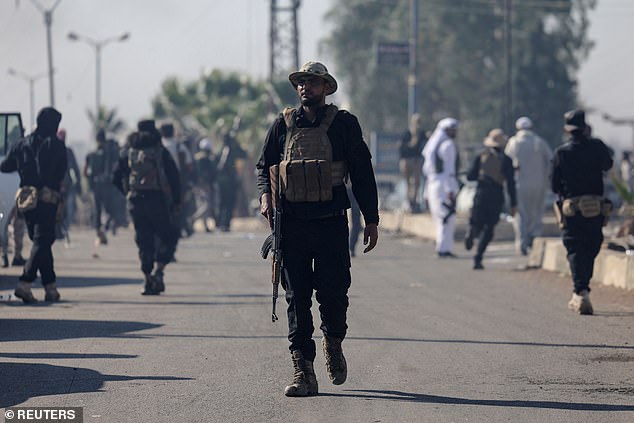
An Internal Security Forces officer walks at an Internal Security Forces checkpoint working to prevent Bedouin fighters from advancing towards Suwayda
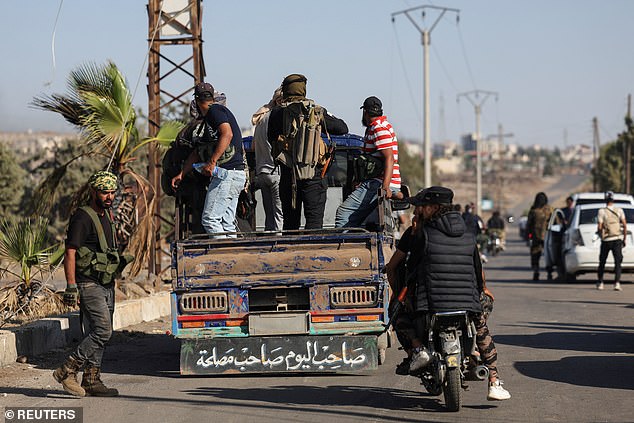
Bedouin fighters stand in the back of a truck at an Internal Security Forces checkpoint
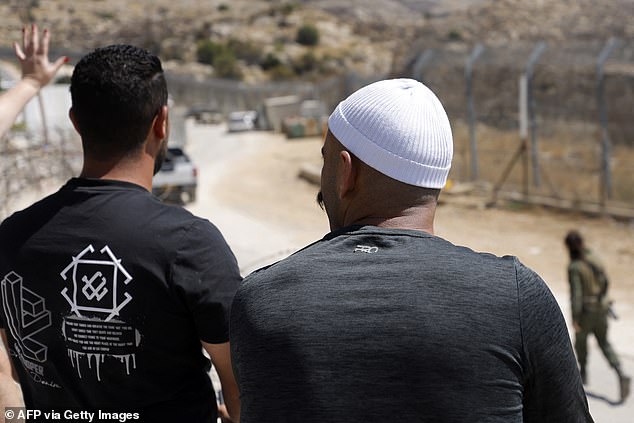
Members of the Druze community at buffer zone as they wait for a chance to see relatives on the Syrian side near the Druze village of Majdal Shams in the Israel-annexed Golan Heights
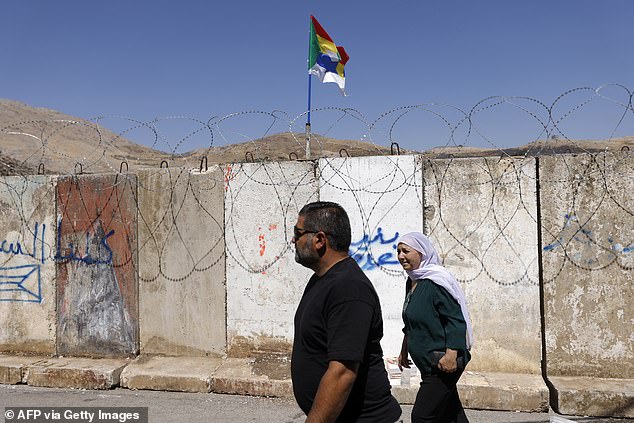
People on the Israeli side of the buffer zone walk past a Druze flag attached to one of the concrete barrier blocks, as they wait for new about relatives on the Syrian side
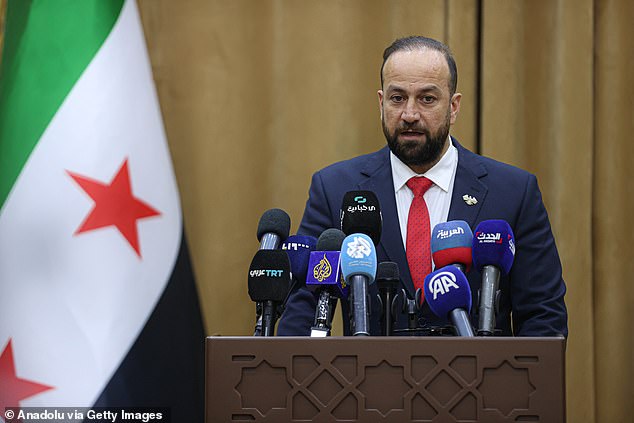
Syrian Information Minister Hamza al-Mustafa holds a press conference in Syria on July 19
Israel has attacked Syrian military facilities in the seven months since Assad fell, and says it wants areas of southern Syria near its border to remain demilitarised.
The US administration, which alongside Turkey and Saudi Arabia has forged ties with the Islamist president despite his past links with Al-Qaeda, was critical of its Israeli ally’s recent air strikes on Syria and had sought a way out for Sharaa’s government.
Sharaa followed up on the US announcement with a televised speech in which he announced an immediate ceasefire in Sweida and renewed his pledge to protect Syria’s ethnic and religious minorities.
‘The Syrian state is committed to protecting all minorities and communities in the country… We condemn all crimes committed’ in Sweida, he said.
The president paid tribute to the ‘important role played by the United States, which again showed its support for Syria in these difficult circumstances and its concern for the country’s stability’.
The European Union welcomed the deal between Syria and Israel, saying it had been ‘appalled’ by the deadly sectarian violence of recent days.
France urged all parties to ‘strictly adhere’ to the ceasefire.
But Israel expressed deep scepticism about Sharaa’s renewed pledge to protect minorities, pointing to deadly violence against Alawites as well as Druze since he led the overthrow of longtime leader Bashar al-Assad in December.


